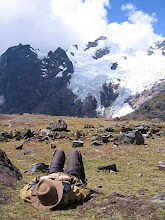I don't know when I started referring to Preemies as "Peanut." It might have been from an Attending at Hopkins, but I think it was probably from Dr. Atherly-John at Jacobi. In any event, I've added it to my medical lexicon ("munchkin" refers to infant-post infant-early toddler, and "rugrat" refers to anything that's likely to pull things off the dinner table up through early adolescent) to described the half-baked "petri-dishes with asthma" that get me sick every Peds ED rotation. Yeah, I'll be a great father.
Anyway, Peanut came in at about week 2 of life. That said, he was born at about 36 weeks, so he really was just out of the gate. He was premature due to oligohydramnios and placental insufficiency caused by maternal malaria. Apparently on pathologic examination the placenta is just full of the little parasites (the which, my marine biologist brother tells me, are more closely related to algae than any other organism...) such that there's actually an increased echotexture on sonogram. Anyway, like any maternal infection without prenatal care, it's not good for baby. So peanut was born 2 weeks ago, and was brought in with a fever to 102 F. He was ridiculously fragile, and had the build of one of the anole lizards we kept as pets when I was a kid and the skin of your 92 year old grandmother. But for all that, looked great. Dehydrated? Sure, a little. But pooping, peeing, breathing, eating. How much more of a repertoire are you asking of this little guy? His breathing was fast, but symmetric and clear, and his airway was fine. The belly was beautiful, all things considered. So I started Peanut on fluids, anti-malarials, antibiotics, and for the love of God keep breastfeeding. So, Peanut was chillin', decked out is his over-sized onesie and toboggan hat (these little puppies must come standard issue from baby/mother boot camp because they are everywhere).
Interesting aside. There was one patient that I was flipping through the Nurses' notes on and came across an awesome phrase. She wrote that “the patient was observed chilling in bed.” Awesome. I immediately had images of a large pair of over-sized sunglasses that make people like Lindsay Lohan look like an owl, a reclining beach chair and an umbrella drink. I surmised that if this were true, we could probably discharge the patient. Turns out, of course, the nurse was referring to the patient as having rigors or “chills,” which can sometimes happen as a result of fever or bacterial infection. Not as much of a vacation scene, but the image was certainly one of those moments that gets you through the day.
In any event, in spite of all the deck stacking against him, Peanut was doing fine. He'd had no fever in 2 days, was eating and so on, and continued to look like a peanut-sized rose. Day three in the late morning I was called over to the crib by the med student, because the mother had gotten her attention. There was Peanut, all wrapped up and fragile and tough and cute. And not breathing. And pulseless. When a kid goes down, chances are it's respiratory in nature. They haven't had a lifetime to abuse their hearts and their respiratory (and neuro-respiratory!) status is relatively tenuous, so it's think lungs before you think heart w/ them (though there has been some recent evidence disputing that).
In a room full of sick kids and their mothers, with a child who never really had a chance and his mother. I gave him two quick breaths, and sent the student for a bag and his chart. The morning note from the other MD was dated about an hour and a half earlier. Things had been fine: Afebrile, good response to interventions, feeding and voiding well. Continue current management. I pulled the slack of the swaddled blanket over Peanut's onesie, toboggan and face, and I told his mother that her child was dead. She borrowed my cell phone to call the family. I wrote the note, with time of death about 13:10. It is common practice to put tetracycline eye ointment in a neonate's eyes after delivery, to treat any potential infections acquired during transit through the birth canal. I thought about how it was entirely possible that since that time, the little boy's eyes had never been opened except when I looked into them when I first met him, and then again on the day he died. There were more patients to see.
Monday, June 29, 2009
Subscribe to:
Post Comments (Atom)

I just stumbled (call me grace) on this in my effort to find the most current email address for you. Having just spent 4 days in the NICU at Seattle children's hosipital for a friend, I'm in awe of you even more so than I always have been. It takes a special person to deal with these tragedies. A balance of compassion and ability to accept live and death, injustice, unfairness, and beauty for anything fleeting and possible all at the same time. You humor and sensitivity never cease to amaze me. You will be a great father, and are a great doctor, and a superior human. Good on ya! You are missed. - Susannah
ReplyDelete